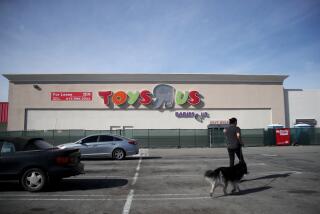Newly Private KB Toys Thinks Long-Term
- Share via
PITTSFIELD, Mass. — When he needs a break, KB Toys CEO Michael Glazer goes for a drive--in the sit-down arcade-style racing game that occupies a corner of his office.
On his coffee table, a gyrating, battery-powered stuffed dog belts out “Who Let the Dogs Out” at the push of a button. And down the halls, stuffed animals are perched in nearly every cubicle.
“We never get depressed around here because we can always come play with the toys,” Glazer said.
In recent months the mood around KB’s headquarters has been even lighter than usual. The company, with a 6% share of the $30 billion U.S. toy retail industry, is back on its own after two decades of being a subsidiary.
KB’s managers, with the backing of a Boston-based venture capital firm, bought out the 1,300-store chain from Consolidated Stores Corp. for $300 million last December.
“Consolidated never believed that Wall Street gave them the value for KB they thought it deserved in the marketplace,” Glazer said in an interview.
The change has been good for all concerned, Glazer said.
“We have more of a sense of ownership,” said Leah Hahn, a field communications manager. “This is our company.”
Sitting in the company’s toy-adorned boardroom, Glazer says there are advantages to being private.
“As a public company, if a store wasn’t performing in a relatively short period of time, you’d say, ‘Wait a second, we better close it and get out,’ ” Glazer said.
Now KB is freer to concentrate on its long-term goals.
“We’re still very focused on our month-to-month composite sales and our quarterly earnings,” he said. “It’s just we don’t feel the same ultimate pressure because Wall Street and the public marketplace are always demanding a certain increase every month.”
KB was founded in Pittsfield by brothers Harry and Joseph Kaufman in 1922 as a candy business. When sugar went scarce during World War II, they switched to toys and gradually expanded around the East Coast and beyond.
Kaufman Brothers changed its named to KB in 1977, and it was acquired by Melville Corp. in 1981. Consolidated took over in 1996.
KB is now trying to build its Internet presence to keep pace with profound changes in the toy industry. Its challenges also extend to its core business: the small KB stores that are fixtures in shopping malls.
Chris Bern, an independent toy consultant, says mall shoppers are demanding more than just goods on the shelves these days.
“You look at how the entire mall is in transformation,” Bern said. “It’s not just walk in and pick up the toy. It’s go to the Disney Store, maybe take in a movie, build a real day of entertainment.”
KB will have to do more to keep up, he says.
“They’ve got this huge equity of the presence in the malls,” Bern said. “It’s time to define that personality, in light of how toy shopping is happening now.”
The very nature of toys has changed, with the emphasis growing toward video games--now 20% of KB’s business--and children showing an earlier preference for teen and adult products. On the retail end, giants like Wal-Mart and Kmart are getting ever more aggressive in toys.
Then there’s the Internet. KBKids.com got off the ground in 1999, with the merger of KB’s own site and BrainPlay.com. Glazer admits the site was creamed while pursuing an initial public offering.
“We did a lot of, from a business standpoint, foolish things,” he said.
Some good news for KB has come out of the demise of dot-com competitors like eToys and Toysmart. But there’s also bad news--Toys R Us and Amazon.com, which agreed to sell toys together last year, are dominating the online market, with sites run by Wal-Mart and Kmart growing fast.
According to the most recent monthly figures from Jupiter Media Metrix, KBKids.com had about 2 million visitors last November, about a third as many as Toys R Us.
Analysts say the name recognition for the KBKids site lags behind Toys R Us and other big names, and that KB is unlikely to catch up any time soon. The Amazon-Toys R Us agreement “was a tough thing for (KB) to go up against,” said Jill Frankle, an analyst at Gomez Research. But any strong retailer needs a Web presence, and KB’s site makes it “an effective multi-channel retailer.”
The toy business has been up and down, but Glazer points out the compound growth rate for the last 20 years has been 6%. Tastes will change, but demand for toys will never disappear.
“Christmas will always come,” he said.
More to Read
Inside the business of entertainment
The Wide Shot brings you news, analysis and insights on everything from streaming wars to production — and what it all means for the future.
You may occasionally receive promotional content from the Los Angeles Times.










